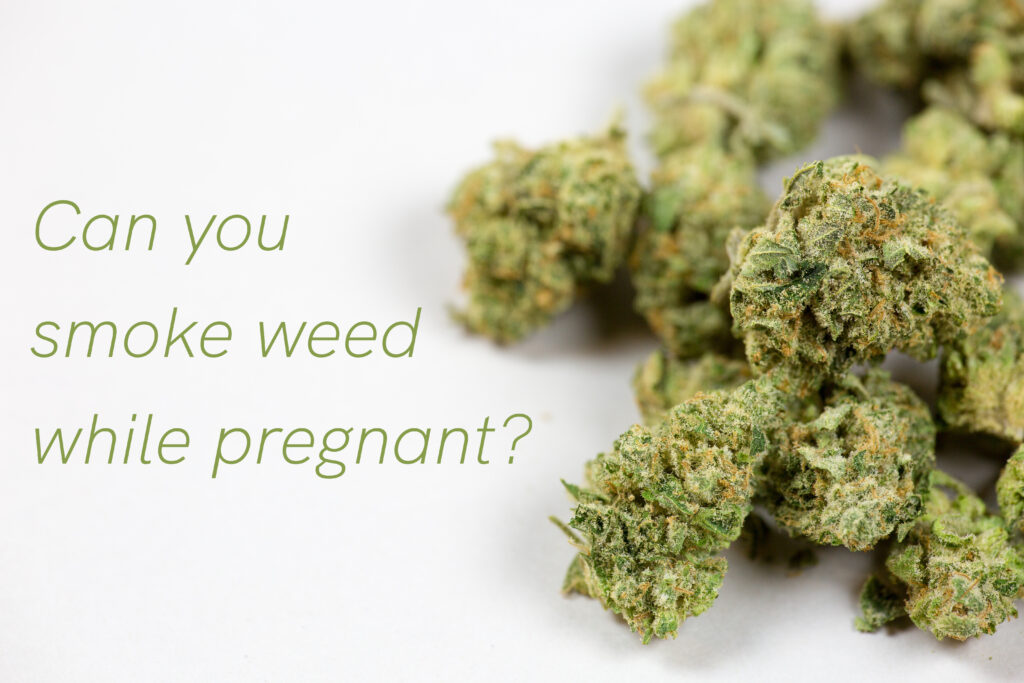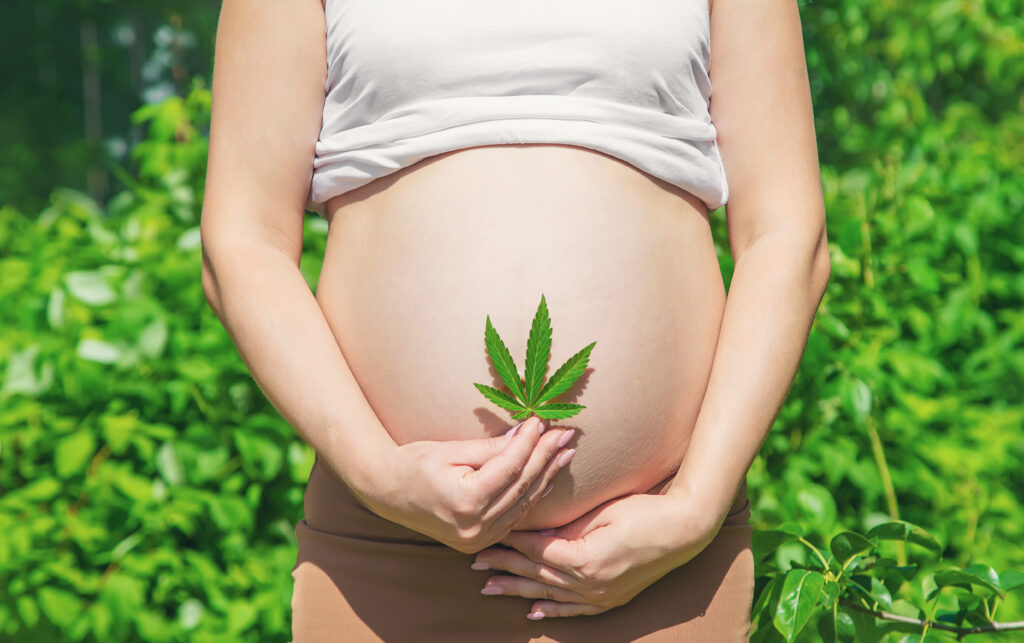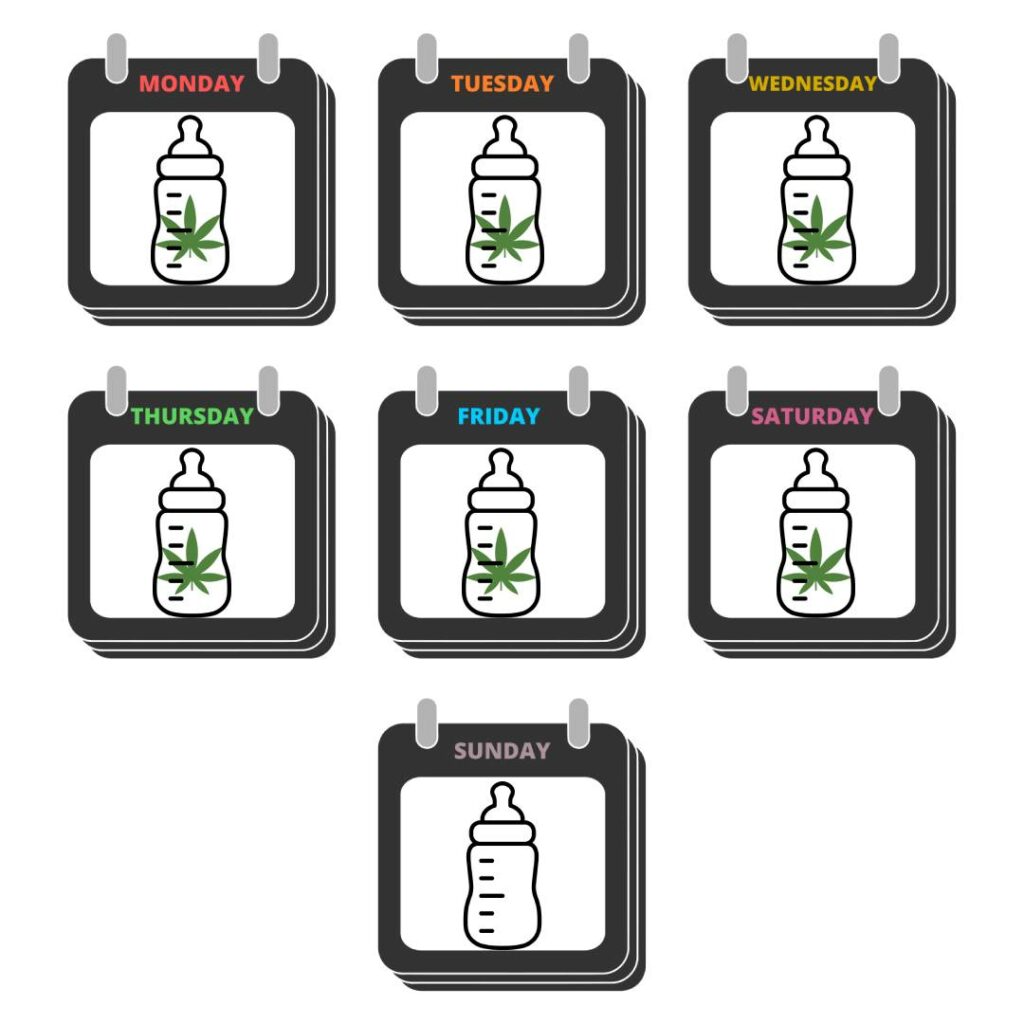Can you smoke weed while pregnant?
Marijuana use is becoming increasingly common as more and more states are legalizing the use of cannabis for both medical and recreational use.
There has been an increase in smoking weed while pregnant as it becomes less taboo, and people have begun to perceive it as a safe drug with few high-risk side effects.
It’s especially popular during the early stages of pregnancy for its anti-nausea and pain killing properties. However, despite its popularity, it’s not often clear whether cannabis is actually safe to use during pregnancy and postpartum, especially by breastfeeding parents.
With the unclear guidelines on whether marijuana is safe to use during pregnancy and breastfeeding, we set out to gather evidence and find the answers so you don’t have to.
Additionally, it’s important to note that while we specifically call out “smoking” in this article, you’ll notice we also frequently say “use” marijuana. “Use” in this case also refers to other methods of ingesting cannabis, such as edibles.
What is marijuana? Why wouldn’t it be safe?
any studies have been done to measure the effects of marijuana and its chemical components on fetal development.
Marijuana – scientific name Cannabis sativa – has psychoactive properties that can help boost one’s mood, relieve pain, and reduce nausea. It’s also commonly used to just get high for fun (probably its most well-known use).
The psychoactive effects are caused by compounds known as cannabinoids, of which there are 104 identified cannabinoids present in marijuana (Lafaye et al., 2017)
Not all cannabinoids present are psychoactive, but THC, which you’ve probably heard of, is.
What are cannabinoids, and why are they important?
To understand that, it’s important to understand the endocannabinoid system, or the ECS for short. The ECS is a regulatory system, and humans produce endocannabinoids as part of it.
The endocannabinoids and the ECS system are responsible for some of our most important bodily functions, such as our sleep, temperature and pain control, immune response, and hunger.
Critically, it’s also responsible for our learning, memory, and emotional processing.
Fetal development, infancy, and early childhood are key times for the development of the ECS. The connections in your brain responsible for these functions are being formed during your early life, so it’s important that there’s no interference.

That’s exactly what makes marijuana so potentially dangerous.
As you might be able to guess from the name, cannabinoids and endocannabinoids are very similar, and are processed by the same neural pathways (Kovacs et al., 2012).
This means that introducing cannabinoids could have a detrimental effect on early development, as they replace our natural endocannabinoids.

Marijuana and pregnancy: are they compatible?
Can I use marijuana while I’m pregnant?
So, can you smoke weed while pregnant for symptom management?
The answer depends on whether cannabinoids pass from parent to fetus, and whether the presence actually affects their growth.
Several studies have been conducted to determine whether one or both of these things are true.
At least one study has shown that cannabinoids, and THC in particular, do in fact cross the placenta. (Ryan, 2018) This means that smoking weed while pregnant is a hazard.
The ECS begins to form during the first trimester, making it a very vulnerable time in fetal development. Therefore, any marijuana use in this period could potentially detrimentally affect the ECS of the baby.
Gunn et al. (2016) found that marijuana use during pregnancy led to decreased birth weight, an increased risk of anemia, and an increased risk of admission to the NICU.
However, when Conner et al. (2016) conducted another study where they controlled for other confounding factors, such as tobacco and alcohol use, no such delays were found.
Of course, none of these studies were perfect. The control groups were limited by self-reporting of marijuana use by the parent, and sample sizes were too small to make any broad generalizations about cannabis use during pregnancy.
For now, the lack of studies available, combined with their limited scope and conflicting results, means that for now, given the risks, you should NOT use marijuana in any form during pregnancy.
If you are someone who does regularly use cannabis, you may be wondering when to stop smoking weed while pregnant. The answer is: immediately.
Okay, but what about breastfeeding?
Just because marijuana use during pregnancy isn’t advised, surely use after birth is fine, right? Like alcohol?
Well, remember the lack of data about cannabis use during pregnancy? Unfortunately, there’s even LESS information on use while breastfeeding.
A couple of studies found that while cannabinoids are found in breast milk, they are diluted to a concentration of 2.5% per kilogram less than is found in the breastfeeding parent, with the infant consuming an average of 8 micrograms per kilogram per day (Metz et al., 2018).
Additionally, a study from 2018 found that THC exists in breast milk for up to 6 days after last use (Bertrand, 2018).
As mentioned previously, cannabinoids interact with the ECS, and can negatively affect your memory, hunger cues, and pain response, among other things.

Cannabinoids can be found in breast milk for up to 6 days after last use.
In an analysis of multiple studies, Metz et al. (2018) found a study that showed cannabis metabolites in infant stool (poop) samples. This presence means that breastfeeding parents are introducing cannabinoids to their infants via breast milk, and that the babies are processing them similarly to adults.
As for how maternal cannabis use actually affects infants, Astley and Little found that use while breastfeeding in the first month postpartum led to decreased motor development in infants.
However, an article cited in a separate analysis of studies (Ryan et al., 2018) found that exposed infants were slightly shorter, but that there were no developmental differences at one year.
Similar to the studies done during pregnancy, these examples had small sample sizes and were unable to eliminate confounding factors. These studies were also done over 30 years ago and have had little to no follow up.
The lack of studies that have looked at the effects – both long and short term – of cannabinoids ingested through breast milk on infants and the known effects of cannabis on adult humans suggest that use during breastfeeding should be discouraged.
Though the very low concentrations of cannabinoids may make it look like occasional use while breastfeeding is okay, it’s advised to avoid any marijuana use while caring for an infant – especially smoking, since smoke (of any kind) has been shown to have further detrimental effects on infants.
This is a subject that requires a lot of additional study – the lack of data on the impact of marijuana on infant and women’s health in the face of increased use is concerning, and will only be resolved through further research.
That was a lot. Can you give me the TL;DR?
Sure!
Our ECS is an important system that’s in charge of many key functions, from our memory, learning, and emotional processing, to our sleeping cues, temperature control, and immune response.
Cannabinoids, the ingredients that make cannabis potent, interfere with the ECS, which starts developing as early as the first trimester of pregnancy.
Although there have not been many studies done on the effects of marijuana use during pregnancy and breastfeeding, it has been shown that cannabinoids do, in fact, cross the amniotic membrane and are also found in breast milk.
What few studies have been done to study the effects of cannabis use during pregnancy and breastfeeding have had several problems, including small sample sizes and conflicting results, making it difficult to form any broader conclusions from them.
Given these limitations on our knowledge, the current recommendations by the AAP and other professional bodies is to avoid using marijuana both during pregnancy and breastfeeding (Drugs and Lactation Database, 2022).
If you have been prescribed marijuana for symptom management or other medical use, please talk to your medical professionals about the right path for you – they may be able to offer other options that have been proven safe for pregnancy and breastfeeding.
Citations
Astley, S J, and R E Little. “Maternal marijuana use during lactation and infant development at one year.” Neurotoxicology and teratology vol. 12,2 (1990): 161-8. doi:10.1016/0892-0362(90)90129-z
Bertrand, Kerri A et al. “Marijuana Use by Breastfeeding Mothers and Cannabinoid Concentrations in Breast Milk.” Pediatrics vol. 142,3 (2018): e20181076. doi:10.1542/peds.2018-1076
Conner, Shayna N et al. “Maternal Marijuana Use and Adverse Neonatal Outcomes: A Systematic Review and Meta-analysis.” Obstetrics and gynecology vol. 128,4 (2016): 713-723. doi:10.1097/AOG.0000000000001649
Drugs and Lactation Database (LactMed®) [Internet]. Bethesda (MD): National Institute of Child Health and Human Development; 2006-. Cannabis. [Updated 2022 Nov 30]. Available from: https://www.ncbi.nlm.nih.gov/books/NBK501587/
Gunn, J K L et al. “Prenatal exposure to cannabis and maternal and child health outcomes: a systematic review and meta-analysis.” BMJ open vol. 6,4 e009986. 5 Apr. 2016, doi:10.1136/bmjopen-2015-009986
Kovacs, Flora E et al. “Exogenous and endogenous cannabinoids suppress inhibitory neurotransmission in the human neocortex.” Neuropsychopharmacology : official publication of the American College of Neuropsychopharmacology vol. 37,5 (2012): 1104-14. doi:10.1038/npp.2011.262
Lafaye, Genevieve et al. “Cannabis, cannabinoids, and health.” Dialogues in clinical neuroscience vol. 19,3 (2017): 309-316. doi:10.31887/DCNS.2017.19.3/glafaye
Metz, Torri D, and Laura M Borgelt. “Marijuana Use in Pregnancy and While Breastfeeding.” Obstetrics and gynecology vol. 132,5 (2018): 1198-1210. doi:10.1097/AOG.0000000000002878
Ryan, Sheryl A et al. “Marijuana Use During Pregnancy and Breastfeeding: Implications for Neonatal and Childhood Outcomes.” Pediatrics vol. 142,3 (2018): e20181889. doi:10.1542/peds.2018-1889
Steiner, Michel A, and Carsten T Wotjak. “Role of the endocannabinoid system in regulation of the hypothalamic-pituitary-adrenocortical axis.” Progress in brain research vol. 170 (2008): 397-432. doi:10.1016/S0079-6123(08)00433-0










